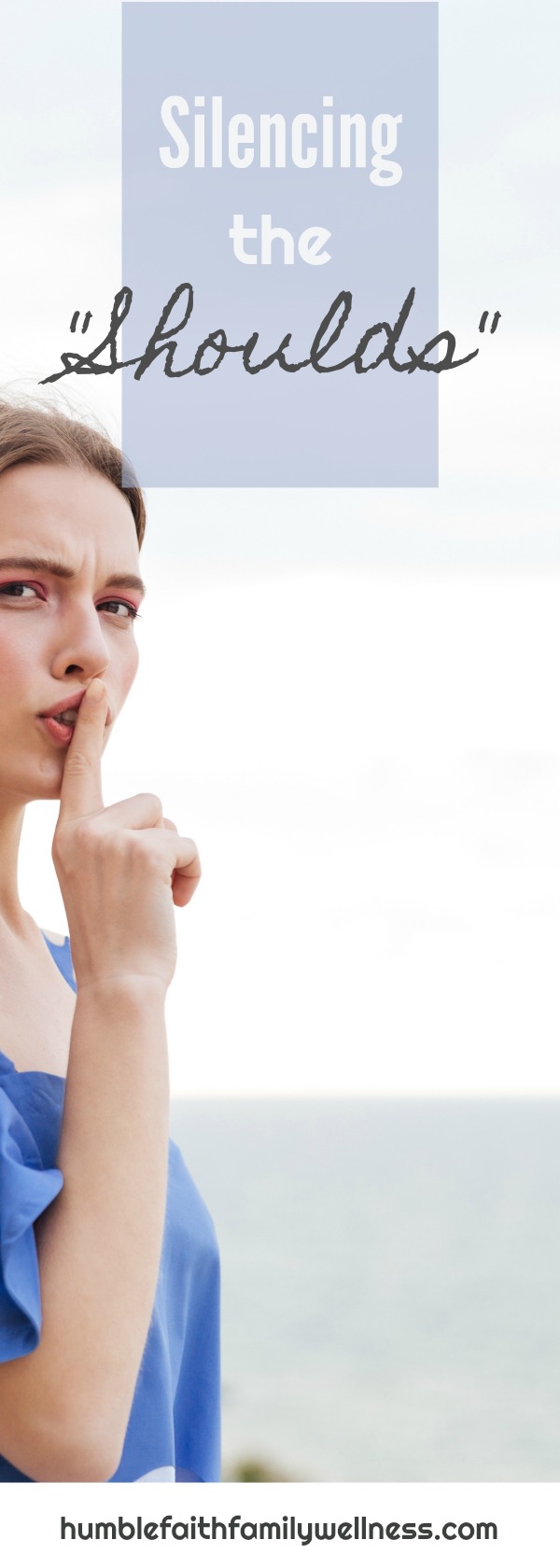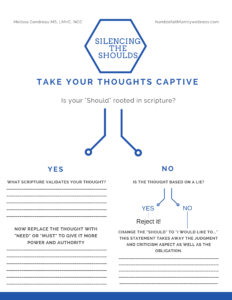
*Disclosure: This post may contain affiliates. Read the full disclosure here.
I should…
How often does that thought roll around in your brain?
It’s a phrase I frequently hear from my therapy clients, in social media posts, in my own head, and sometimes even from the pulpit.
But time and time again, the shoulds come from and/or lead to a place of guilt, shame, and judgment.
So let’s silence the critical shoulds and replace them with healthier thoughts.
Should Definition
There are actually multiple definitions and usages of the word should. And certainly, not all of them are negative. (all definitions and examples are from Oxford Dictionary)
- Used to indicate obligation, duty, or correctness, typically when criticizing someone’s actions.
- ‘he should have been careful’
- Used to indicate what is probable.
- ‘the bus should arrive in a few minutes’
- Formal (expressing the conditional mood) referring to a possible event or situation.
- ‘if you should change your mind, I’ll be at the hotel’
- Used in a clause with ‘that’ after the main clause describing feelings.
- ‘it is astonishing that we should find violence here’
- Used in a clause with ‘that’ expressing purpose.
- ‘in order that training should be effective, it must be planned systematically’
- (in the first person) expressing a polite request or acceptance.
- ‘I should like some more, if I may’
- (in the first person) expressing a conjecture or hope.
- ‘he’ll have a sore head, I should imagine’
- Used to emphasize to a listener how striking an event is or was.
- ‘you should have seen Marge’s face’
As you can read, there is nothing negative about examples 2-8, however, how often are you using should in those manners?
I know that is not typically how I am using it!
So let’s look closer at the first definition.
Obligation and Duty…
Obligation and duty focus on an act or course of action to which a person is morally or legally bound.
For example, as a therapist, I am ethically and legally required to report abuse. Because of my profession, I am bound by this law. Clearly, this is an important law that I am to uphold. And if I don’t, serious repercussions can happen to the person I don’t attempt to protect. As well as understandable repercussions to my therapy license.
This is clear-cut and just.
…Typically when criticizing someone’s actions
This is what makes the first definition so negative. We often turn the “shoulds” into criticisms and judgments of others and/or ourselves.
This one, little word then takes on tremendous weight and condemnation that we have no right to press upon others.
[ctt template=”7″ link=”a6bB6″ via=”yes” ]We often turn the “shoulds” into criticisms and judgments of others and/or ourselves. This one, little word then takes on tremendous weight and condemnation that we have no right to press upon others. [/ctt]
This type of criticism and judgment tends to come from a place of pride and piousness. A desire (whether realized or not) to compare the actions of yourself or the group/church/ministry you are associated with to someone else.
Luke 6:37-42 (NIV)
37 “Do not judge, and you will not be judged. Do not condemn, and you will not be condemned. Forgive, and you will be forgiven. 38 Give, and it will be given to you. A good measure, pressed down, shaken together and running over, will be poured into your lap. For with the measure you use, it will be measured to you.”
39 He also told them this parable: “Can the blind lead the blind? Will they not both fall into a pit? 40 The student is not above the teacher, but everyone who is fully trained will be like their teacher.
41 “Why do you look at the speck of sawdust in your brother’s eye and pay no attention to the plank in your own eye? 42 How can you say to your brother, ‘Brother, let me take the speck out of your eye,’ when you yourself fail to see the plank in your own eye? You hypocrite, first take the plank out of your eye, and then you will see clearly to remove the speck from your brother’s eye.
Instead, we are to humble ourselves and acknowledge the areas that we need to ask God to shine light into so that we can walk more closely with Him.
False Definition
But we tend to go even further with this little word. Often our “shoulds” are used in situations that aren’t even tied to legal or moral issues but greatly tied to criticism and judgment.
They become this arbitrary ruling from society or our own thoughts onto others and ourselves. Look at the definition of arbitrary – based on random choice or personal whim, rather than any reason or system.
“I should be thinner.”
“I should be able to take a vacation.”
“You should never drink alcohol.”
“You should spend more time in ministry.”
These examples aren’t based on moral or legal standing and yet each one is dripping with judgment.
James 4:11-12 (NASB)
11 Do not speak against one another, brethren. He who speaks against a brother or judges his brother, speaks against the law and judges the law; but if you judge the law, you are not a doer of the law but a judge of it. 12 There is only one Lawgiver and Judge, the One who is able to save and to destroy; but who are you who judge your neighbor?
Should – through a new lens
We first need to recognize the times we are allowing “should” to enter into our mind. This is a process of taking every thought captive. Being focused and aware of our own thought processes and the emotions tied to them.
We see Paul describing this process in 2 Corinthians 10:5 (NIV) We demolish arguments and every pretension that sets itself up against the knowledge of God, and we take captive every thought to make it obedient to Christ.
Once you isolate the thought:
- First, compare it against scripture and law. *This is why knowledge of scripture is imperative.
- If your thought is rooted in scripture – change the should to NEED or MUST. In addition to should often being rooted in judgment, we also have a tendency to use it as a less firm statement. But God is not wishy-washy. And neither is scripture.
- Example: “I should pray.” is rooted in scripture, therefore, changing the statement to “I need to pray.” turns it into conviction instead of condemnation.
- If your thought is NOT rooted in scripture – Identify where it is coming from.
- If based on a lie – Reject the thought! It doesn’t belong there and won’t help you!
- Example: “I should lose weight so people think I’m a good wife.” There is no way to make this statement true or positive.
- If not based on a lie – Change the should to I would like to… This statement takes away the judgment and criticism aspect as well as the obligation.
- Example: “I should be able to take a vacation.” This is not rooted in scripture, but not necessarily a lie, therefore, changing the statement to “I would like to be able to take a vacation.” This helps you to focus on your emotions and potentially address them better.
- If based on a lie – Reject the thought! It doesn’t belong there and won’t help you!
I pray this post helps you to more appropriately and effectively silence the “shoulds” that need to be silenced and replace them with thoughts that are rooted in scripture.
Sign up below for access to this worksheet and all of my other free printables and worksheets in my resource library!

God bless!
Melissa
p.s. Check out all of the beautiful sites I link-up with.

The “shoulds” can be overwhelming, can’t they? I can do relate to this. Thanks, Melissa!
They can definitely be overwhelming. Thank you for stopping by Heather. God bless!
Hand raised here. I admit that I have had a history of making personal tasks be a should when they indeed were not. Things that were more of a desire or “it would be a good idea if”. Being aware truly is the first step! Thanks for the reminder, Melissa.
It can be an easy habit to fall into and a difficult task to stop. It takes practice and dedication to become aware and refute. Thank you for stopping by and sharing your thoughts. God bless!
So this is a piece my counselor and I often tackle. The should statements show me where I need to look deeper at my heart at what I have allowed to become a belief or expectation that is not always based in scripture. So thankful for the promise of the Holy Spirit to help me take my thoughts captive!
Yes, the shoulds generally come from past pain and lies that have taken root. I’m thankful for the Holy Spirit, too! We are ever blessed!
The more we think of everything we do as obligation, the heavier our life becomes. Delight is a much better motivator.
Delight is definitely a much better motivator! And when we do things out of love and delight – our behaviors follow suit because we are generally more aligned with God!
One of my favorite things to say is “Don’t should on me”. I have to say it to myself more than anyone else because of my tendency to judge myself on how many things I cross out on my list.
Yes, that was a phrase by the psychoanalyst, Albert Ellis. He also had a very colorful phrase about the word “must”!
I loved this! I have a post in my back burner about “shoulds” and it is titled “don’t should on me ” as Alice mentioned—I always found that so funny, but SO true! I love how you broke down the definitions and gave the advice to turn the “should” into need or must- it certainly gives it a different perspective.
Thank you Susan. Yes, turning the phrase into need or must provides action instead of a passive response. Thank you again for stopping by and sharing your thoughts. God bless!
I have lots of “shoulds” going through my mind all day. It’s definitely worth it taking them to God first instead of carrying them around!
Yes, it is so much more freeing when we release our negative thoughts and test the lies against God’s truth. Thank you for stopping by Tia! God bless!
Thank you for the substitute thoughts. It helps me to have something to replace it with, instead of just ‘I should stop believing that I should be…’
I’m glad you found the post beneficial Aryn. The ability to have positive, replacement thoughts absolutely helps change our perspective and outlook. Thank you for stopping by and sharing your thoughts. God bless!
I love this. I don’t usually fall into the trap of placing ‘shoulds’ on other people, but I sure do it to myself a lot. I had a therapist several years who pressed me on it, and I’ve definitely gotten better at it since then, but it’s hard. There are so many things our culture tell us we ‘should’ be doing, but really we just need to look to the Bible for confirmation on where our efforts should be placed.
Thank you for sharing this post.
It is hard, Sophie. Our past creates ‘shouds’ and our society definitely does. Yes, the Bible gives us the opportunity to confirm our thoughts. The hardest part is recognizing the ‘should’ is even happening and then taking it captive. I’m glad this is an area you have worked on and grown in. Thank you for stopping by and sharing your experience. God bless!
Thanks for pointing this out and writing this up in detail. I think most of us feel duty-bound in some way to be doing something and can constantly feel someone else is on our back, even when sometimes they aren’t when no-one is there. After a while it becomes a self-imposed inner monologue, either because we hear a parent’s or person in authority’s voice playing inside our heads. This can eat into our joy and also our sense of peace, because we always feel we “should” be doing something.
In Jesus there is joy and peace, and also rest, where we don’t have to feel we “should” be doing anything because he has already done it for us.
You’re right, Robert. The inner monologue and multitude of ‘shoulds’ robs us of joy. And I couldn’t agree more – Jesus is the source of all joy and peace! Thank you for stopping by and sharing your thoughts and insights. God bless!
It’s is so so SO good! I’m sharing it everywhere and pray God reaches many through it!
Thank you so much for your kind words Lori and for sharing the post! God bless!